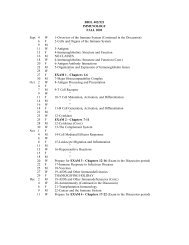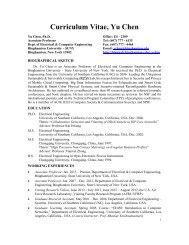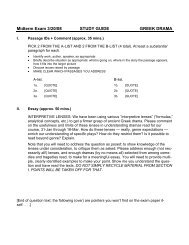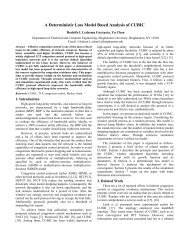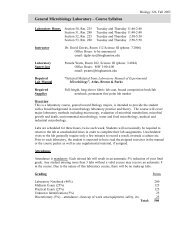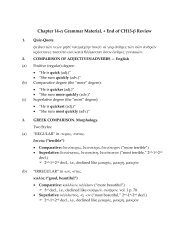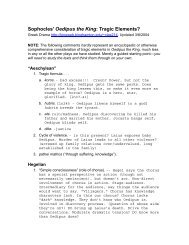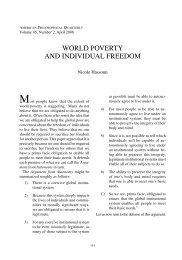Aristotle Poetics - Harvey.binghamton.edu
Aristotle Poetics - Harvey.binghamton.edu
Aristotle Poetics - Harvey.binghamton.edu
Create successful ePaper yourself
Turn your PDF publications into a flip-book with our unique Google optimized e-Paper software.
<strong>Aristotle</strong> <strong>Poetics</strong> 13<br />
10<br />
20<br />
A peripeteia (reversal) is the change from one state of things within the play to its opposite<br />
of the kind described, and that too in the way we are saying, in the probable or necessary<br />
sequence of events. Take Oedipus. For him, the opposite state of things is produced<br />
by the Messenger, who, coming to gladden Oedipus and to remove his fears as to his<br />
mother, reveals the secret of his birth. 60 And in the Lynceus: just as Lynceus is being led<br />
off for execution, with Danaus at his side to put him to death, the incidents preceding this<br />
bring it about that he is saved and Danaus put to death. 61 An anagnorisis (recognition) is,<br />
as the very word implies, a change from ignorance to knowledge, and thus to either love<br />
or hate, in the characters marked for good or evil fortune. The finest form of recognition<br />
is one attended by reversals, like that which goes with the recognition in Oedipus the<br />
King. 62 There are no doubt other forms of it; what we have said may happen in a way in<br />
reference to inanimate things, even things of a very casual kind; and it is also possible to<br />
discover whether some one has done or not done something. But the form most directly<br />
connected with the plot and the action of the piece is the first-mentioned. 63 This, with a<br />
reversal of fortune, will arouse either pity or fear—actions of that nature being what tragedy<br />
is supposed to represent. And it will also serve to bring about the happy or unhappy<br />
ending. The recognition, then, being of persons, it may be that of one person only to the<br />
other, the latter being already known; or both persons may have to discover each other.<br />
Iphigenia, for instance, was discovered to Orestes by sending the letter; and another recognition<br />
was required to reveal him to Iphigenia. 64<br />
Two parts of the plot, then, the reversal and recognition, are on matters of this sort. A<br />
third part is suffering (pathos), which we may define as an action of a destructive or painful<br />
nature, such as murders on the stage, tortures, woundings, and the like. The other two<br />
have been already explained. 65 12<br />
30<br />
The parts of tragedy to be treated as formative elements in the whole were mentioned in a<br />
previous Chapter. From the point of view, however, of its quantity, that is, the separate<br />
sections into which it is divided, a tragedy has the following parts: prologue, episode,<br />
exodos, and a choral portion, this last divided into parodos and stasimon. These last two<br />
are common to all tragedies, whereas songs from the stage and kommoi are only found in<br />
some. 66 The prologue (prologos) is all that precedes the parodos 67 of the chorus; an epi-<br />
60 I.e., that Oedipus has killed his father; that leads to the realization that he has<br />
married his mother.<br />
61 This is the now lost Lynceus of Theodectes.<br />
62 I.e., Sophocles’, which we shall read.<br />
63 I.e., recognitions like that in Sophocles’ Oedipus the King.<br />
64 Euripides’ Iphigenia among the Taurians. Orestes is about to be sacrificed by<br />
Iphigenia, his sister. But when each sibling comes to realize who the other is, the killing<br />
is averted.<br />
65 The tragic poets themselves, as we shall see, clearly regard this element, pathos,<br />
as very important. So the chorus in Aeschylus’ Agamemnon: “Through suffering, knowledge!”<br />
(pathei mathos).<br />
66 “Songs from the stage” are solo arias for actors.



